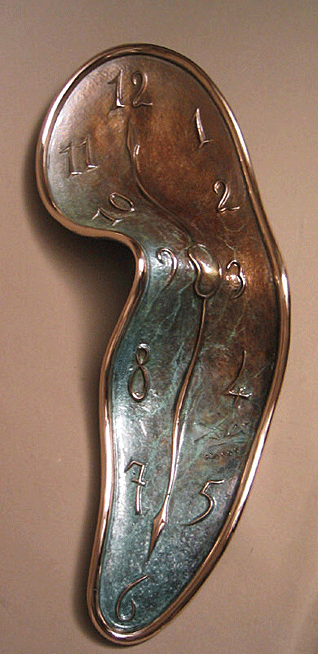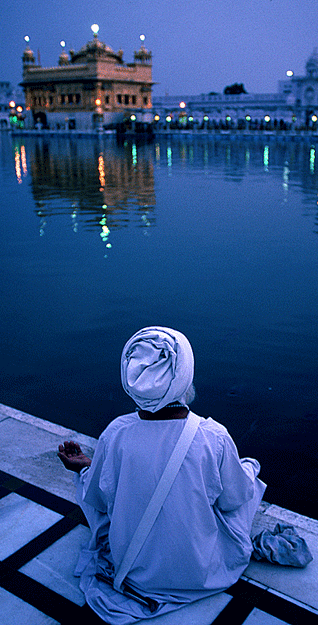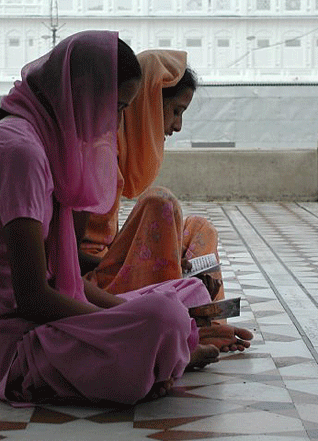
Above: from "Alice in Wonderland". Below: first from bottom - detail from photo by Dariusz Klemens. Second from bottom - detail from photo by Nordog. Third from bottom - A watch inspired by Salvadore Dali.



Columnists
Timelessness Is Of The Essence
by GURU KAUR
My wristwatch is part of my body. I look at it when I wake up. I run my entire day's schedule by it. I don't even take it off when I go to bed.
Therefore, when I received a piece of advice from someone whom I deeply respected, prefaced by "... and this is going to change your life in India completely", the last thing that I ever imagined it could be was: "Leave your watch behind!"
"No, you don't understand", I protested, "no one would ever want to steal it; it's not flashy at all. In fact, I never remove it from my wrist, so I'm never going to leave it behind anywhere. And, it's waterproof to thirty meters; it could surely withstand the monsoon."
I arrived in India without my watch, only to discover that, unlike in England, it wasn't always that easy to find out the time. I was surprised to realize how often, back home, I would look across at Big Ben for that reassurance of its hands ticking relentlessly on.
I spent the summer of 1998 living in a nivaas, part of the Durbar Sahib complex in Amritsar. They were halcyon days of decompression as my Western mindset mellowed out.
Ironically, there were two clock towers, but they never told the same time. It didn't take me long to learn that time was essentially manmade.
But, timelessness was a gift.
My days began with the first chords of Asa di Vaar floating from the loudspeakers in the Harmandar Sahib, a far cry from the shrill bleep of the alarm clock I'd abandoned. Having bathed in the sarovar, I walked around the parkarma, awaiting the blast from the trumpet to signal the procession from the Akal Takht.
The changing light from night's shadows, through the rosy glow on the cheeks of dawn, to the sharp morning focus, meant it was time for breakfast. Afternoon seva of washing the parkarma was announced by the clattering of metal buckets being carried out from the storeroom. And so the day went on, until finally the evening raagis lulled us into deep slumber.
That autumn, I moved to live with a family in Anandpur Sahib. I began to practice my basic Punjabi. Quickly, I learned a whole new time-frame which is, I'm sure, not mentioned in any book. Ik mint! - "just a minute!" - does not, as you may perhaps rightly expect, mean sixty seconds from now. Nor does punj mint mean five times that, and duss mint mean a full ten minutes, or the time it would take to cook pasta at home.
No, nothing is simpler: ik mint translates into: "it will happen sometime soon, probably within, say, half an hour; punj mint as "it will happen today - obviously, I'm not guaranteeing it, but I'm pretty sure of it".
But if someone said something was only duss mint away, it was a sure-fire bet that if it did ever happen, there was no point waiting, because it could just as easily be tomorrow, or better still - make alternative arrangements!
I realized how conversant with this I had become when we were setting up the camp for our group of five hundred Americans. One of the women I worked with had gone into the town itself with my Punjabi friend to buy some water-pipe.
He came back without her saying that she was "just now coming". The taxi station said it would be ten minutes before a taxi came, so she's getting the donkey from our neighbour! I didn't see anything strange in this at all; but I did notice one of the recently arrived Americans looking on in total bewilderment.
A few days later, at the height of the Tercentenary Celebrations, I was sitting with the BBC film crew in the office by Keshgarh Sahib, all ready for the interview I'd set up with the Jathedar. We were just whiling away the time, grateful to be eating ice-cream under the fan. One of the sevadaars came over to me, silently nodding towards an Englishwoman.
At first I was taken aback - it had been a while since I'd seen western clothes. The kitten heels seemed out of place among the bare feet, including mine. Most of all, what caught my eye was the glinting of her watch face reflecting back the omnipresent fluorescent light. It not only seemed out of place, but also out of an alien time frame.
She was getting very agitated. Very agitated indeed. In fact, now that I thought of it, she'd been there when I popped in earlier in the day to confirm everything and she didn't look so cool back then either.
As I approached her, she was positively effervescing: "you said SIX hours ago that this would only take ten minutes! What do you mean, it's going to take another ten minutes? It'll be ready at 4 p.m. then?" A quick glance at the BBC clock told me that the time now was 15.50 precisely.
Before coming to live in India, I probably would have thought the same. Now I understood that "when the time is right" means exactly that. It's got nothing whatsoever to do with clocks, watches and timers. It's by Guru's grace.
My watch has remained packed away in the cupboard since. My day is still punctuated by the sun and the Shabd Guru. And most amazingly of all, it runs to time.
November 23, 2007
[Guru Kaur is a corporate consultant, writer, clothing designer and an expert on the integration of professional and personal ambitions. She lives in London with her husband, the photographer Nick Fleming, and their puppy Millie. Their web sites are http://www.gurukaur.com/ and http://www.nickfleming.com/. ]
Conversation about this article
1: I.J. Singh (New York, U.S.A.), November 22, 2007, 5:38 PM.
Right. In India, the concept of time marching furiously along is entirely alien. The past, present and future merge seamlessly. And the collage created as a result is most seductive.
2: Brijinder Khurana (Delhi, India), November 23, 2007, 1:26 AM.
Very nice article. Soft and gentle words have been used to describe the sweetness of Punjab, such as "ik mint", "punj mint" and "dus mint". While reading this, I felt a glow of pleasure. Thank you.
3: Satinder Gill (Khanna, India), November 24, 2007, 1:14 AM.
We moved back to India from Canada two years ago and, really, I should have left my watch behind. The pace of life, despite all the growth, is different here. I laugh at myself at times for taking punctuality so seriously and am slowly learning to become part of the system without giving in too much. I love the way the entire nation rises from slumber around ten in the morning and even coffee shops open at that time. So much for your morning cuppa. If I commit the blunder of walking into a shop at their announced opening time, I am sure to disrupt the morning sweeping rituals and find myself dodging the broom. The "ik mint", duss mint" rule is so apt and this law of time finds applications everywhere. On the other hand, people are always in a rush to get somewhere and I will be mowed down if I am trying to cross the road, expecting the traffic will slow down and let me pass. Standing in line at check-out counters is an alien concept and we will take our own time to discipline ourselves. Life has its funny moments despite all our quirks and foibles and at the end of the day, "yeh India hai, meri jaan!"
4: Satvir Kaur (Boston, U.S.A.), November 26, 2007, 10:45 AM.
We can discipline ourselves as much as we want, but we can't do much vis-a-vis "others". About the entire nation waking up at 10, I don't agree with that. In my "pind" in Punjab, everyone is up before I get up and I got up around 6-6:30 am!
5: Satinder Gill (Khanna, India), November 29, 2007, 12:36 AM.
Satvir Kaur ji, I think you missed the essence of my post. I too live in a "pind" and yes, you are absolutely right: people are up and about very early. Our babaji at the gurudwara makes sure we all do. I was talking about the urban culture, the business establishments and offices, etc. As far as disciplining ourselves is concerned, Rome was not built in a day and yet it did see the light of day. Surely, one can do his or her own part without trying to be a pioneer and change the world.


